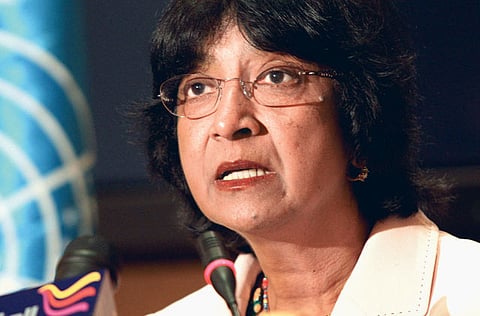UN lauds GCC's progress on human rights
Human rights in the GCC countries are improving at a faster pace than that perceived by the outside world, the UN Human Rights Chief said

Abu Dhabi: Human rights in the GCC countries are improving at a faster pace than that perceived by the outside world, the UN Human Rights Chief said in the capital on Saturday.
"Clearly the winds of change are blowing strongly throughout the region on a number of fronts — perhaps strongly than we had anticipated when preparing this mission, and more strongly than many people in the outside world realise," Navi Pillay said at a press conference here.
She reached the capital for a two-day visit as part of a ten-day mission to visit the six Gulf Cooperation Council (GCC) countries, thereby becoming the first UN rights chief to visit all the GCC.
While acknowledging changes that are underway, Pillay said more attention needs to be given to women's rights, migration, statelessness, and freedom of expression, association and assembly.
"These areas of concern are common to all six countries," she said.
Pillay said that she came with an open mind but was aware of "how the region is portrayed in the international media, particularly on issues related to women's rights and migrant labour."
"What I find admirable is that the issues are being addressed and advances are being made and this is the aspect that is unknown to the international community", she told Gulf News.
Now that changes are underway, her role is to help maintain the momentum and accelerate it, she said.
Visit: Leaders to meet Pillay
Navi Pillay, UN High Commissioner for Human Rights, will shortly meet President His Highness Shaikh Khalifa Bin Zayed Al Nahyan and His Highness Shaikh Mohammad Bin Rashid Al Maktoum, Vice-President and Prime Minister of the UAE and Ruler of Dubai as part of her two-day visit.
Pillay expressed confidence that her meetings would enable her to have a comprehensive picture.
"Preliminary reports indicate that the UAE is in line with international laws and initiatives with regard to tackling the sponsorship rule, conditions of expatriate workers and the rights of women, child and people without documents proving their identity," Pillay said.
— WAM



